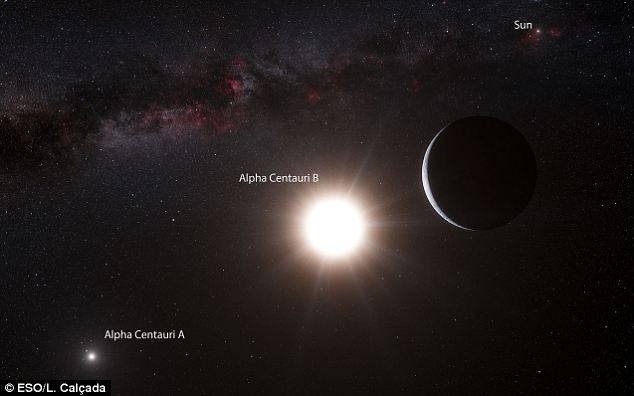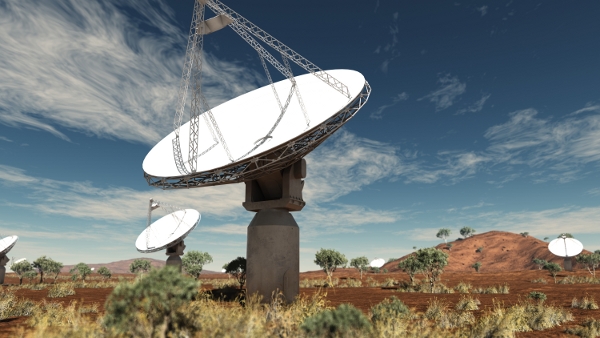Home » Science
ESO discovers Earth-sized planet in nearest star system to Earth
Next-door neighbour: An artist’s impression of the recently found planet orbiting Alpha Centauri B, a member of the triple star system that is the closest to our own (click on the image to enlarge it)
An Earth-sized planet has been found orbiting a star in Alpha Centauri, our nearest neighbouring solar system.
The mystery world circling Alpha Centauri B is thought to be much too hot to support...
Astronomers Discover Planet with 4 Stars
Astronomers have identified a giant gas planet, located just under 5,000 light-years away, that its sky is illuminated by four different stars (suns).
According to the report published in Astrophysical Journal, the planet named PH1, after the Planet Hunters site, is slightly larger than Neptune and about six times the size of Earth.
Two US volunteers, Kian Jek of San Francisco and Robert Gagliano...
Scientists Are Now Working To Make Humans Immortal
Who doesn’t wish to live on this earth for ever? But death is inevitable. Human beings under the natural process of aging slowly move towards death. Of course, dreadful diseases like cancer often cause human beings to die young.
Scientists in advanced countries are now working vigorously on finding out the ways and means to extend human life expectancy, they are even aspiring to make humans...
Ziggurat structure found on Mars by Italian Researcher
The well-known Italian Mars-researcher Matteo Ianneo has discovered a new geometric structure on Mars, a Ziggurat.
Ziggurats were massive structures built in the ancient Mesopotamian valley and western Iranian plateau, having the form of a terraced step pyramid of successively receding stories or levels.
Matteo Ianneo has a great portfolio of discoveries which includes human face shapes, statues,...
Astonishing spider fossil discovered in Myanmar
100-million-year-old fossilized spider attack
Scientists have discovered a rare fossil of a spider, featuring the animal hunting a wasp during the dinosaur age.
The finding as the first fossil ever discovered of a spider attack, was found in the Hukawng Valley of Myanmar and dates back to Early Cretaceous period between 97 to 110 million years ago.
Researchers suggest that both the attacking spider...
Chinese scientist says humans used to eat pandas
A Chinese scientist has said that prehistoric man ate the bears in what is now part of the southwestern Chinese city of Chongqing.
In an interview with The Chongqing Morning Post, Wei Guangbiao, the head of the Institute of Three Gorges Paleoanthropology at a Chongqing museum, said that many excavated fossils “showed that pandas were once slashed to death by man,” The Associated Press reported...
Austrian skydiver jumps from outer space, break sound barrier
Austrian daredevil Felix Baumgartner has become the first human to break the sound barrier by a freefall jump from the edge of space.
Baumgartner, 43, leaped off a capsule more than 39 kilometers above the earth with his speed reaching 834 miles (about 1,342 kilometers) per hour, or 1.24 times the speed of sound, on Sunday.
He jumped from an altitude of 39,045 meters and landed in the New Mexico desert...
UK and Japanese scientists receive Nobel Medicine Prize for stem cell study
Kyoto University Professor Shinya Yamanaka (L) and John Gurdon of the Gurdon Institute in Cambridge
John Gurdon from the UK and Shinya Yamanaka from Japan have won the 2012 Nobel Prize for medicine or physiology for their research on stem cell.
Both scientists were awarded for their groundbreaking discovery of changing adult cells into stem cells, which can become any other type of cell in the body.
The...
Cosmetics industry: Pioneering work can replace testing on animals
A team of researchers at the Centre for Neuroscience (CNC) and the Faculty of Pharmacy, University of Coimbra (UC), Portugal, has developed a groundbreaking test for the detection of cutaneous chemical allergen (skin sensitization assessment), which will significantly reduce the testing animals in the cosmetics industry.
Coimbra – Portugal. Pioneering test developed at the University of Coimbra...
Astronomers Discover Nearby Planet Composed of Diamonds
Illustration shows cross-section view of 55 Cancri e
A team of American-Franco researchers led by Yale University have discovered a nearby planet, twice as big as Earth, with a mantle that could be composed largely of diamonds.
The planet, known as 55 Cancri e, is located just 40 light years away in the constellation of Cancer and is likely covered in diamond and graphite rather than water and granite,...
Scientists discover the exact spot where Julius Caesar was assassinated
A concrete structure confirms that Julius Caesar was stabbed in the center of the Curia di Pompeo, while presiding over the meeting of the Senate in the year 44 BC… Researchers of the Spanish Superior Council of Scientific Investigations (SCSI) discovered the exact place of the assassination of Julius Caesar in the year 44 BC, the SCSI said on Wednesday.
Researchers of the Spanish Superior Council...
Dakosaurus: Giant vacuum cleaner of Early Cretaceous seas
Paleontologists from the UK found out more about the lifestyle of the masters of the Early Cretaceous seas – marine crocodiles from Metriorhynchidae family. It turns out they hunted in the same way as the contemporary killer whale, by tossing a victim in the air and tearing it apart. However, some of them sucked their prey in like giant vacuum cleaners.
The history of marine life of the Mesozoic...
Deadly brain-eating microbe outbreak in Pakistan
Naegleria fowleri surrounded by white cells in spinal fluid
Pakistan’s major city Karachi was struck by an outbreak of Naegleria fowleri, also known as ‘brain-eating amoeba.’ The deadly freshwater microbe kills 98 percent of those infected. The source of the infection has yet to be identified.
The amoeba is transmitted from contaminated water through the nasal cavity and travels to the brain,...
Aussie super-scope begins ET hunt
The initial stage of unprecedented radio telescope has been officially opened in Australia. The project will explore the universe in search of new galaxies, black holes, planets and even intelligent extraterrestrial life – if there is any.
In the heart of red desert where man-made radio signals are minimal the AUS$152 million worth telescope will scan space for traces of the beginning of the universe,...
Russian beacon to track menacing asteroid Apophis
Russia’s space agency wants to send a mission to Apophis, the notorious asteroid which may change its course and eventually collide with Earth. It will plant a radio beacon, which will help track the celestial body and assess the risks it poses.
The 300-meter-wide asteroid first made headlines in 2004, when NASA reported that it has 1 chance in 223 of impacting on our planet in 2029. It was even...

























